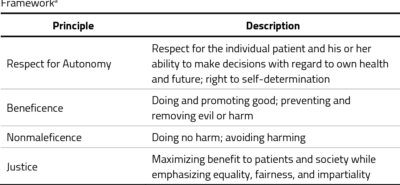Table of Contents
Ethics in healthcare marketing is fundamental because you know how competitive the industry can get. Search engines are also very strict with healthcare content due to the sensitivity and possible impact of the information shared. Therefore, it’s important to remember that healthcare marketing is subject to ethical considerations that differ from other industries.

The healthcare industry has a unique responsibility to provide honest, accurate, and transparent information to patients. As a healthcare marketer, it’s your job to ensure that your marketing efforts align with these values. You must be careful not to mislead or deceive patients in any way. This means that you must be honest about the services you offer, the qualifications of your staff, and the results patients can expect to achieve.
At the same time, you must also be mindful of patient privacy and confidentiality. You cannot share patient information without their consent, and you must always protect their privacy in your marketing efforts. Additionally, you must be careful not to exploit patients or their vulnerabilities in any way. This means that you must avoid using scare tactics or other manipulative techniques to persuade patients to choose your services over others.
Foundational Ethics in Healthcare Marketing
When it comes to healthcare marketing, ethical considerations are of utmost importance. The healthcare industry is unique in that it involves the well-being of individuals, making it essential to maintain ethical standards in all marketing practices. Below are some of the foundational ethics in healthcare that should guide your marketing efforts.
Principles of Medical Ethics

Medical ethics is the study of the moral principles that govern medical practice. These principles include autonomy, beneficence, non-maleficence, and justice. Autonomy refers to the right of patients to make decisions about their own healthcare. Beneficence refers to the obligation of healthcare providers to act in the best interest of their patients.
Non-maleficence refers to the obligation of healthcare providers to do no harm to their patients. Justice refers to the obligation of healthcare providers to treat patients fairly and equitably. As a healthcare marketer, it is essential to understand these principles and ensure that your marketing practices align with them.
Patient-Centered Care
Patient-centered care is an approach to healthcare that prioritizes the needs and preferences of patients. This approach involves treating patients with respect, dignity, and compassion and involving them in their own care. As a healthcare marketer, it is essential to keep the patient at the center of all marketing efforts. This means creating marketing materials that are informative, transparent, and easy to understand. It also means respecting the privacy and confidentiality of patients.
Confidentiality and Privacy
Confidentiality and privacy are essential components of healthcare ethics. Patients have a right to privacy when it comes to their healthcare information, and healthcare providers have an obligation to protect this information. As a healthcare marketer, it is essential to understand the laws and regulations governing patient privacy and confidentiality. This means ensuring that all marketing materials are HIPAA-compliant and that patient information is never shared without their consent.

Marketing Strategies in Healthcare
Marketing is an essential aspect of any healthcare organization. It helps healthcare providers to create, communicate, and provide value to their target market. Modern marketers start from customers rather than from products or services. They are more interested in building a sustainable relationship than in ensuring a single transaction.
Advertising Ethics
Advertising in healthcare is a way to inform the public about the services and products that are available to them. However, advertising in healthcare is subject to strict regulations to ensure that the information provided is accurate, truthful, and not misleading. Healthcare providers must ensure that their advertising is ethical and does not make exaggerated or false claims.
Brand Management
Brand management is the process of creating, developing, and maintaining a brand. A brand is a name, term, design, symbol, or other feature that identifies a product or service. In healthcare, brand management is crucial for building trust and loyalty with patients. Healthcare providers must ensure that their brand reflects their values and mission.
Online Marketing
Online marketing is a way to reach a wider audience and promote healthcare services and products. Healthcare providers must ensure that their online marketing is ethical and complies with regulations. Online marketing can include social media marketing, email marketing, and search engine optimization.

Target Audience
Healthcare providers must identify their target audience to create effective marketing campaigns. The target audience can be segmented by age, gender, income, and other factors. As a healthcare provider, you must first know the people you are marketing to and ensure that their marketing campaigns are tailored to their target audience to be effective.
Regulatory Landscape of Healthcare Marketing
Any healthcare marketing content is often strictly regulated, making it important to understand the regulatory landscape in order to avoid legal issues and maintain ethical practices. This includes adhering to healthcare advertising laws, protecting patient privacy, and ensuring data security. Below are some important considerations for each of these areas.
Healthcare Advertising Laws
Healthcare advertising laws are in place to prevent false or misleading claims in marketing materials. This includes everything from brochures and pamphlets to online ads and social media posts. To avoid legal issues, it’s important to ensure that all claims made in marketing materials are accurate and backed up by evidence. You should also avoid making any claims that could be interpreted as diagnosing or treating a medical condition without proper licensing.
Patient Protection
Patient protection is a key consideration when it comes to the ethics of healthcare marketing. This includes protecting patient privacy, ensuring that marketing materials are not misleading or coercive, and avoiding any practices that could be seen as taking advantage of vulnerable patients. For example, it’s important to obtain informed consent from patients before using their personal information in marketing materials. It’s also important to avoid using fear tactics or other forms of manipulation in marketing materials.
Data Security

Data security is another important consideration when it comes to healthcare marketing. This includes protecting patient data from unauthorized access, ensuring that data is stored securely, and avoiding any practices that could compromise patient privacy. Paying attention to these dynamics will ensure that all marketing materials are compliant with HIPAA regulations and other data security laws. You should also ensure that any third-party vendors used in marketing campaigns are compliant with data security regulations.
Ethical Challenges and Debates
Ethical challenges and debates have emerged regarding the appropriate use of marketing strategies in healthcare. Here is a discussion of some of the most pressing ethical issues in healthcare marketing, including direct-to-consumer advertising, pharmaceutical marketing, and conflict of interest.
Direct-to-Consumer Advertising
Direct-to-consumer (DTC) advertising is a marketing strategy that targets patients directly, bypassing healthcare providers. While DTC advertising can be an effective way to raise awareness about health conditions and treatments, it has raised ethical concerns about the accuracy and fairness of the information provided.
Critics argue that DTC advertising can lead to overdiagnosis and overtreatment, as patients may request medications or treatments that they do not need. Moreover, DTC advertising can create unrealistic expectations among patients, leading to disappointment and dissatisfaction with their healthcare providers.

Pharmaceutical Marketing
Pharmaceutical marketing is another area where ethical concerns have been raised. Pharmaceutical companies have been accused of using aggressive marketing tactics to promote their products, including providing incentives to healthcare providers to prescribe their drugs.
This has led to concerns about conflicts of interest and the potential for healthcare providers to prioritize financial gain over the best interests of their patients. Moreover, pharmaceutical marketing has been criticized for creating unrealistic expectations among patients about the effectiveness of certain drugs, leading to disappointment and frustration when the drugs do not work as advertised.
Conflict of Interest
Conflict of interest is a broader ethical issue that affects all areas of healthcare, including marketing. Healthcare providers and organizations may have financial or other interests that conflict with their duty to provide the best possible care to their patients.
For example, a healthcare provider may have a financial interest in prescribing a certain drug or treatment, even if it is not the best option for the patient. Similarly, a healthcare organization may prioritize profits over patient care, leading to decisions that are not in the best interests of patients.
Stakeholder Perspectives
When it comes to healthcare marketing, there are several stakeholders involved, each with their own unique perspective. These stakeholders include healthcare providers, patients, policymakers, and insurers. Understanding each stakeholder’s perspective is crucial in developing an ethical and effective healthcare marketing strategy.
Healthcare Providers
Healthcare providers play a critical role in the healthcare industry, and their perspective is essential when it comes to healthcare marketing. Providers need to be able to trust that the marketing messages being presented to their patients are accurate and not misleading. They also need to ensure that marketing efforts do not compromise the quality of care they provide.

Patients
Patients are the ultimate consumers of healthcare, and their perspective is perhaps the most important. Patients need to be able to trust that the marketing messages they receive are truthful and not misleading. They also need to be able to make informed decisions about their healthcare based on accurate information.
Policymakers
Policymakers play a significant role in shaping the healthcare industry, and their perspective is essential when it comes to healthcare marketing. Policymakers need to ensure that marketing efforts do not undermine public health goals or compromise the quality of care provided by healthcare providers.
Insurers
Insurers play a critical role in the healthcare industry, and their perspective is essential when it comes to healthcare marketing. Insurers need to ensure that marketing efforts do not compromise the quality of care provided or undermine public health goals. They also need to ensure that marketing messages are accurate and not misleading.
In summary, understanding the perspectives of healthcare providers, patients, policymakers, and insurers is crucial when developing an ethical and effective healthcare marketing strategy. By taking into account the needs and concerns of each stakeholder, healthcare marketers can develop marketing messages that are truthful, accurate, and effective.

Case Studies and Best Practices
When it comes to healthcare marketing, it’s important to prioritize ethics and responsibility. By following best practices and learning from successful and controversial campaigns, you can create effective marketing strategies that maintain integrity and build trust with your audience.
Successful Ethical Campaigns
One example of a successful ethical healthcare marketing campaign is the “Choose Wisely” initiative. This campaign was launched by the American Board of Internal Medicine Foundation and aimed to educate patients about unnecessary medical tests and procedures. By providing clear and concise information, the campaign empowered patients to make informed decisions about their healthcare.
Another successful ethical campaign was the “Truth” anti-smoking campaign. This campaign targeted young adults and used bold and graphic imagery to convey the harmful effects of smoking. The campaign was effective in reducing smoking rates among young adults and was praised for its honesty and transparency.
Controversial Marketing Tactics
Not all healthcare marketing campaigns are successful or ethical. One controversial tactic is the use of celebrity endorsements or influencer marketing. While celebrity endorsements can increase brand awareness, they can also create unrealistic expectations and promote unhealthy behaviors. For example, the Kardashians were criticized for promoting appetite-suppressant lollipops on social media, which could lead to dangerous dieting habits.

Another controversial tactic is the use of fear-based messaging. While fear can be an effective motivator, it can also be manipulative and misleading. For example, some weight loss programs use fear-based messaging to sell their products, which can lead to unhealthy and unsustainable weight loss practices.
By learning from successful and controversial campaigns, you can create ethical and effective healthcare marketing strategies that prioritize trust, transparency, and responsibility.
In conclusion, ethics in healthcare marketing plays a vital role in ensuring the information people get, especially those who are potential clients, is credible, accurate, and useful. By analyzing the foundational ethics, regulatory issues, stakeholder perspectives, and other best practices, you will be adhering to the ethical guidelines of healthcare marketing, which is bound to earn you a good return on investment for your efforts.







